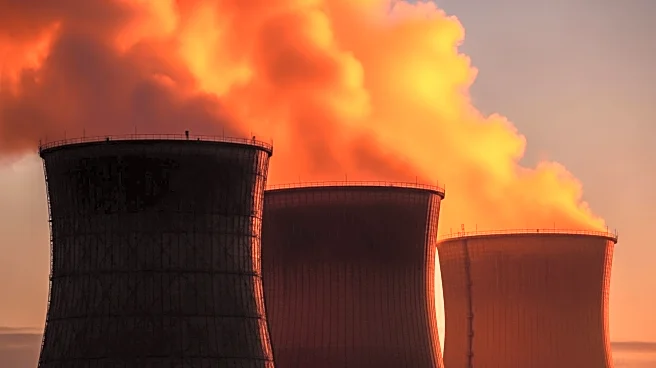What's Happening?
Ukraine has reportedly struck the Shatura Thermal Power Plant in the Moscow region, igniting a fire. This action comes amid ongoing hostilities between Russia and Ukraine, with Russian forces launching
98 drones at Ukraine in overnight attacks. Ukrainian authorities claim that 69 of these drones were shot down or jammed, but several targeted key locations, causing significant damage. In Dnipro, a drone strike injured 15 people, including a child, and sparked fires in residential areas. The southern port city of Odesa also faced attacks on energy facilities, leading to emergency crews extinguishing fires. The strikes are part of a broader pattern of military engagements, with Ukraine targeting Russian infrastructure as Moscow intensifies its attacks on Ukraine's energy systems.
Why It's Important?
The strike on the Shatura Thermal Power Plant represents a significant escalation in the conflict between Ukraine and Russia. By targeting critical infrastructure within Russia, Ukraine is demonstrating its capability to retaliate against Russian aggression. This development could further strain relations between the two nations and potentially lead to increased military responses from Russia. The ongoing conflict has already resulted in significant civilian casualties and damage to infrastructure, impacting the daily lives of people in both countries. The international community remains concerned about the potential for further escalation and the broader implications for regional stability.
What's Next?
As winter approaches, the focus on energy infrastructure becomes increasingly critical. Russia's intensified attacks on Ukraine's energy systems aim to weaken the country during the colder months. Ukraine's retaliatory strikes on Russian infrastructure could provoke further military actions from Russia, potentially leading to a cycle of escalation. The international community may increase diplomatic efforts to mediate the conflict and prevent further deterioration of the situation. Humanitarian organizations are likely to continue providing support to affected civilians, while governments may impose additional sanctions or take other measures to influence the course of the conflict.










